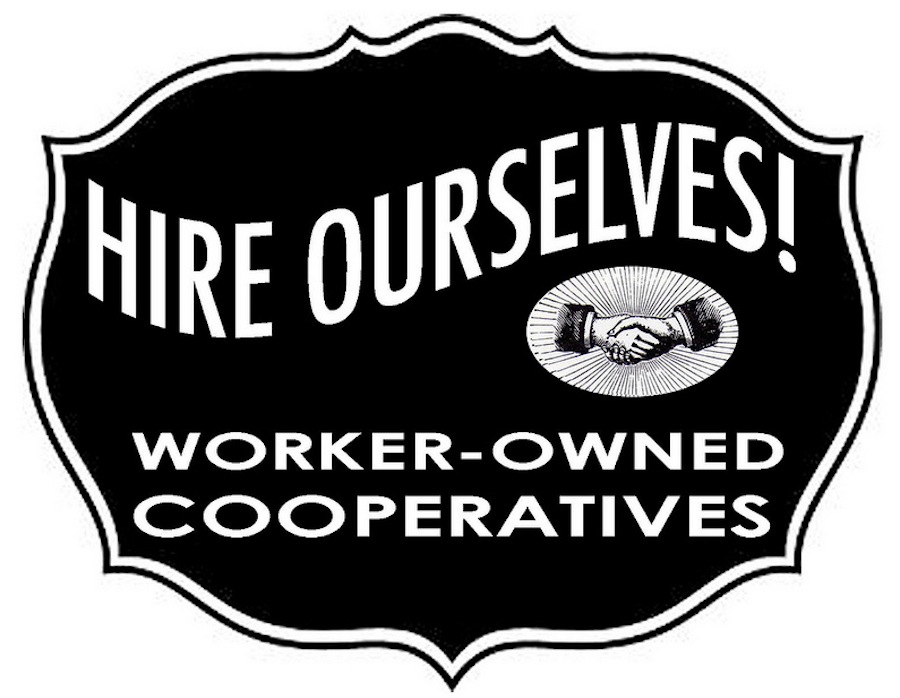
The beginning of a year is always a good time to review the fundamentals. That goes double this year, because it seems quite timely to reaffirm our commitment to democracy.
So, what is a worker co-op, and why would you want one?
A worker co-op is a business in which all the owners are workers, and most or all of the workers are owners. This distinguishes a worker co-op from a consumer co-op, in which the customers are the owners, and a producer co-op, in which small businesses or farms are the owners. Worker co-ops are also distinct from ESOPs (Employee Stock Ownership Plans), in which the employees own stock, but rarely have any input into how the company is run.
Workplace democracy is central to the nature and identity of a worker co-op. In fact, the US Federation of Worker Co-ops recognizes and includes democratically operated workplaces that aren’t formally cooperatives at all.
Now, you might wonder, doesn’t democratic decision-making take longer than having a boss simply make decisions? And the answer is, yes, it does. But, it’s worth it, because the decisions are consistently better than if any one person makes them. This is demonstrated by the fact that the large majority of worker co-ops survive their perilous first three years, whereas the large majority of conventional businesses do not. And here are some further benefits of workplace democracy…
- Above-median pay. Worker-owners decide their own pay scales, and as you might expect, the difference between the highest-paid and lowest-paid workers is far smaller than in a conventional business. In some worker co-ops, there’s no difference at all.
- High standards for workplace safety. When the workers make the decisions, they naturally decide to value their own safety.
- Flexible scheduling. Workers who make decisions together are going to be understanding about each other’s time.
- A healthy work culture. Worker-owners don’t magically become angels, but with an equitable balance of power among the staff, toxic situations can be addressed quickly.
- Low turnover. Once people acclimatize to having a say in the workplace, it’s very difficult to go back to taking orders. And with the advantages on this list, why would you?
- Longevity. Worker co-ops don’t relocate in search of lower taxes or looser regulations. They are stable, reliable, long-term community members.
- Environmental sustainability. As community members, worker-owners are aware of their impact on their surroundings, and show ecological responsibility.
- Resilience in hard times. The recent downturn in the economy confirms what previous downturns showed, which is that worker co-ops have the flexibility to adjust their practices at will. This means they have a dramatically lower rate of closure than conventional businesses.
At this point, you might wonder, if worker co-ops are so great, why aren’t there more of them? After all, Wisconsin has a great co-op law, compared to a lot of other states. There are several reasons.
- The most obvious (and arguably most important) is that so few people know about worker co-ops in the first place. They are hardly ever mentioned in our education system, at any level. They barely ever get mentioned in the news, and when they are, there’s no substantive analysis around them.
- When people do hear about them, it takes a while to internalize the message that you can do this. We don’t practice democracy at school or at any conventional job. We vote for politicians every few years, but that’s representative democracy, not direct democracy, like a worker co-op has. So, there’s an adjustment, and a learning curve.
- Launching a new business is hard enough under normal circumstances, but when you try to do it democratically, it takes longer, and can be hard to explain to conventional funders.
- No one gets rich working at a co-op. You’ll likely make a decent salary, hopefully with decent benefits (depending on the size of your co-op), but you will never become a millionaire. Salaries and profit distributions are democratically decided.
MCDC exists to address these obstacles (well, not the last one) and reduce the racial and economic disparities in the Madison area. We can provide you with co-op education, resources, and even start-up money, if you qualify for one of our grants. We’ve helped seven co-ops open their doors already, soon to be nine. Many of the worker-owners in them have told us they never expected to be business owners, and now they are. If they can do this, you can do this.
Take some time to look over our website, http://mcdcmadison.org, and then write to Charity Schmidt at charity.schmidt@wisc.edu to learn even more about how we can help you. We look forward to meeting you and hearing all about your ideas.